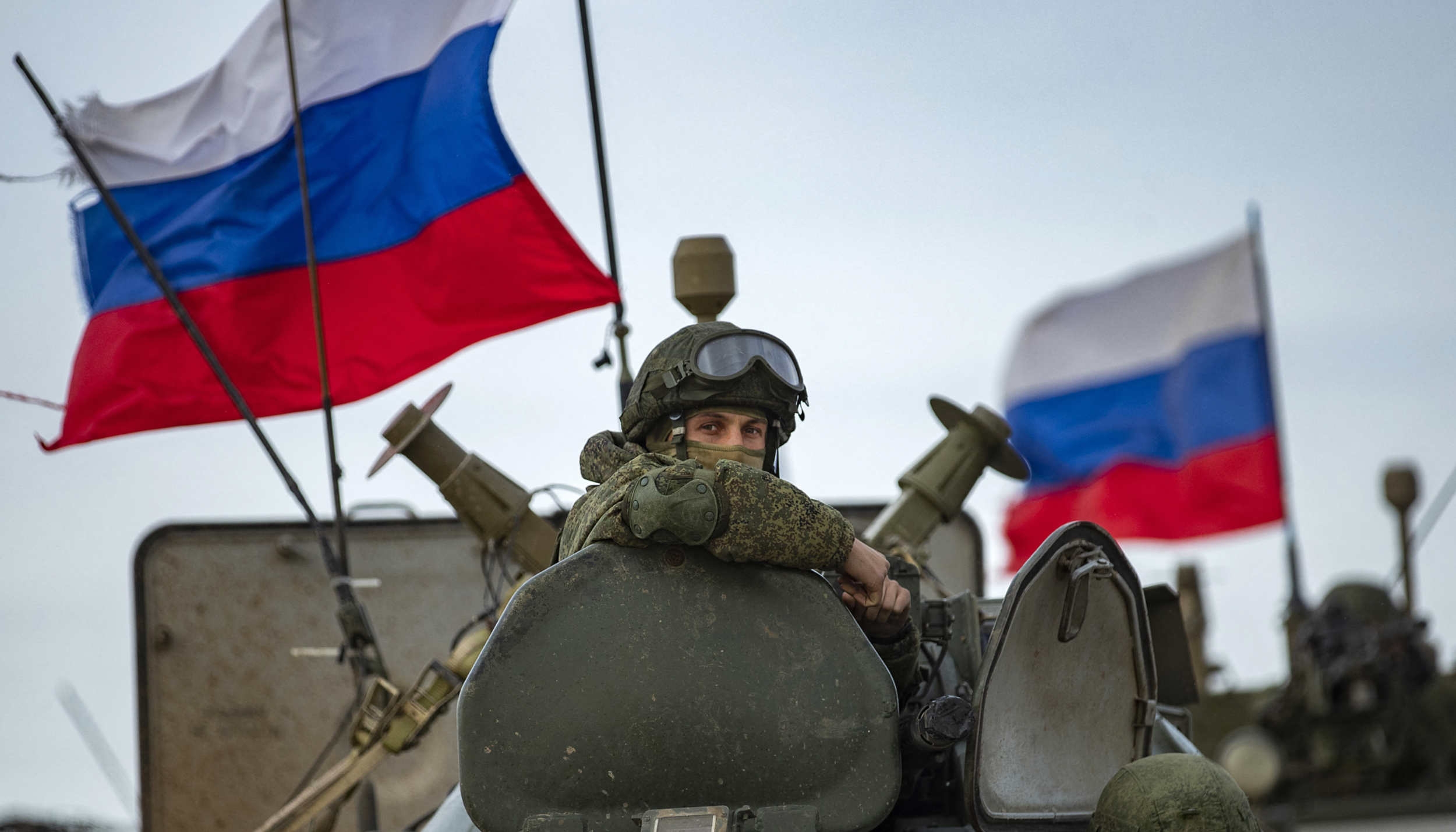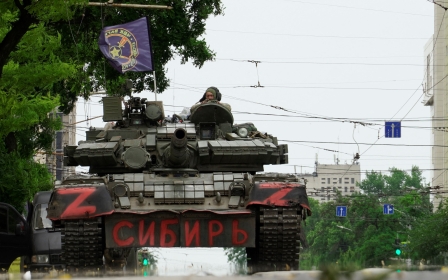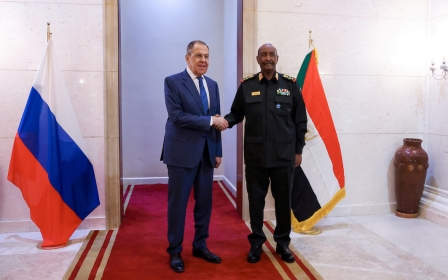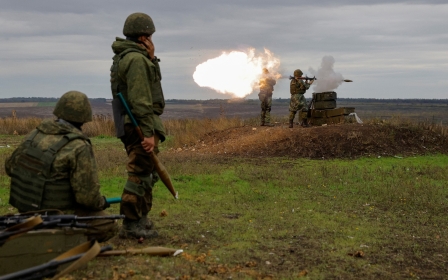What the Wagner Group's insurrection means for the Middle East and Africa

The Wagner Group's rebellion against the Russian state could have major repercussions not only for the group's operations in the Middle East but also for Moscow's ability to replace the financial and military networks fostered by the paramilitary outfit in the region.
The mercenary group, which launched an armed mutiny overnight Saturday, has built a spider's network of military, business and political relationships over the past decade that encompass Libya, Syria, Sudan and the United Arab Emirates.
Wagner forces fighting in Ukraine had also until recently been a crucial asset supporting the Russian military on the battlefield. The self-funded force recently provided Russia with its first recent discernible victory when it captured the strategic town of Bakhmut.
But the group's considerable capabilities might not have been so well-honed were it not for its experiences in the Middle East and Africa. Wagner mercenaries cut their teeth fighting side-by-side with Russian troops in the battlefields of Syria, as a stand-alone outfit in Libya, and are even involved in the current conflicts in Sudan, Mali and the Central African Republic (CAR).
"Wagner really started its Africa operations in Libya and did so in a very effective manner. It was a bridgehead that the UAE facilitated at the time from which Wagner was able to really expand," Andreas Krieg, associate professor of security studies at King's College London, told Middle East Eye.
New MEE newsletter: Jerusalem Dispatch
Sign up to get the latest insights and analysis on Israel-Palestine, alongside Turkey Unpacked and other MEE newsletters
While Wagner is not an official company in Russia, since the existence of private military companies is not allowed, the group has nonetheless created shell companies outside the country that it used to self-finance its operations and propel itself to power.
Its "strategically significant" bridgehead in Libya allowed the group to create links with Mohamed Hamdan Dagalo, better known as Hemeti, who heads the paramilitary Rapid Support Forces (RSF), Krieg added.
The RSF, a militia force like Wagner, is now embroiled in its own rebellion against the Sudanese state.
Wagner and the UAE
Wagner, which is under the control of Yevgeny Prigozhin, until recently a close ally of Russian President Vladimir Putin, is sanctioned by the United States and other countries for a network of investments made in places like Sudan, Mali and the CAR.
Billions of dollars worth of gold have allegedly made their way from Sudan to the UAE, much of which is widely thought to be facilitated by Wagner.
MEE reached out to the UAE Ministry of Foreign Affairs for comment but did not receive a response by time of publication.
US officials have openly expressed that it believes some of the gold mining concessions operated by Wagner have been partly re-directed towards Moscow's $130bn gold stash, helping Putin's administration circumvent the effect of economic sanctions imposed over the Ukraine war.
'Wagner would not be able to operate if they no longer had access to the infrastructure, financial logistics, gold trade infrastructure that the UAE has provided'
- Andreas Krieg, security analyst
"The Kremlin relied on the UAE to facilitate many of the Wagner operations across Africa in 2018 because at the time it was a tool of Russian partially soft power but also hard power," said Krieg.
Last year, the US accused Wagner mercenaries of exploiting natural resources in the CAR, Mali, Sudan and elsewhere in the continent, which it would not have been able to do without the UAE.
"Prigozhin in particular had good relationships with the UAE, which is an important partner for Russia because there are a lot of private personal networks between Abu Dhabi and Kremlin elites," Krieg said.
The multibillion-dollar question now is the extent to which Putin will pressure UAE President Mohammed bin Zayed Al Nahyan to "clamp down" on these networks, Krieg said.
"Wagner would not be able to operate if they no longer had access to the infrastructure, financial logistics, gold trade infrastructure that the UAE has provided," he added.
While the Wagner, Sudan and UAE nexus has been a key relationship that has made all sides significant amounts of money, the Russian paramilitary group's military skills have been much sought after in other conflict areas.
Russia's strategic interests in Libya
Since 2019, Wagner mercenaries have played a crucial role in helping Libya's eastern renegade military commander turned warlord Khalifa Haftar to maintain control over the country's southern and eastern regions.
"Without an alternative foreign security umbrella, the withdrawal of Wagner would pose a threat to Haftar's influence in eastern and southern Libya," said Ferhat Polat, a researcher at the University of Exeter with a focus on Libyan affairs.
'The withdrawal of Wagner fighters could impact Russia's geostrategic interests'
- Ferhat Polat, University of Exeter
With Wagner's help, the Libyan conflict has effectively become a cold war. Haftar's Libyan National Army (LNA) and the internationally recognised Tripoli government are likely looking at events in Russia and what it might mean for the balance of power in the country.
"The Wagner mercenaries have provided the necessary military expertise and resources that are not available within the LNA," Polat told MEE.
"The Kremlin's increased presence has given them greater leverage over western powers. The withdrawal of Wagner fighters could impact Russia's geostrategic interests. However, it remains unclear whether Russia will actually withdraw its mercenaries from Libya," he said.
Wagner's presence in Syria
Syria was one of Wagner's first forays outside Europe. The group deployed mercenaries to fight alongside the forces of Bashar al-Assad in 2015, at the same time that Putin launched an air campaign in support of Damascus.
It's difficult to draw "bold conclusions" at the moment and the unfolding situation has a "tremendous amount of potential to impact the Ukraine war as well as Russia's foreign policy in the Middle East at large," Giorgio Cafiero, CEO of Washington-based geopolitical risk consultancy Gulf State Analytics said.
"Clearly what is happening in Russia undermines Russian unity, and there is potential for actors in the Middle to look at Russia differently," he said.
Syria is one of the few publicly documented conflict zones where US forces have directly engaged Wagner fighters. In 2018, the US military killed between 200 and 300 pro-Assad fighters, many of whom were assumed to be Wagner mercenaries, after they assaulted a US military outpost in eastern Syria.
Syria is a linchpin for Moscow's projection of regional power. Russia has strategic access to the Eastern Mediterranean through its naval base in Tartus. Meanwhile, companies linked to Wagner have obtained lucrative stakes in oil and gas deposits in territory formerly controlled by the Islamic State group.
"No matter how the latest crisis unfolds, Russia's power projection is bound to be diminished across the MENA region," said Yonatan Touval, an analyst at the Israeli Institute for Regional Foreign Policies (Mitvim).
Post-Wagner power vacuum
While the war in Ukraine has meant that Russia has had to reduce its military presence in Syria, Wagner has also been impacted.
"Wagner Group has been struggling to keep its operations across multiple fronts too, with the additional challenge posed by strong pressure exerted by the US on its Middle East allies to expel its mercenaries from Sudan and Libya," Touval told MEE.
"The key question is whether these developments will create a power vacuum that will allow other players to enter, with the downside being rapid destabilisation in such areas as Syria and Libya."
'The Wagner branches in Africa may turn into completely uncontrollable mercenary structures'
- Kirill Semenov, Russian International Affairs Council
The weakening Russian hand in the region is already being felt. MEE reported last year that Russia had to delay servicing Middle Eastern arms clients because of supply shortages as a result of the war in Ukraine.
While Russia's military presence in Syria means that Wagner's activities can be quickly stopped in Libya and other African countries, this is going to be "more difficult" if Moscow moves to liquidate the group, said Kirill Semenov, a non-resident expert with the Russian International Affairs Council.
"There are no Russian troops in these other regions, and local regimes work directly with Wagner and not with official Russian structures," said Semenov, speaking to MEE from Russia.
"It cannot be ruled out that if the rebellion is suppressed, and I hope this will happen soon, the Wagner branches in Africa may turn into completely uncontrollable mercenary structures that will themselves build ties with local governments without regard to Moscow," Semenov said.
This article is available in French on Middle East Eye French edition.
Middle East Eye delivers independent and unrivalled coverage and analysis of the Middle East, North Africa and beyond. To learn more about republishing this content and the associated fees, please fill out this form. More about MEE can be found here.




